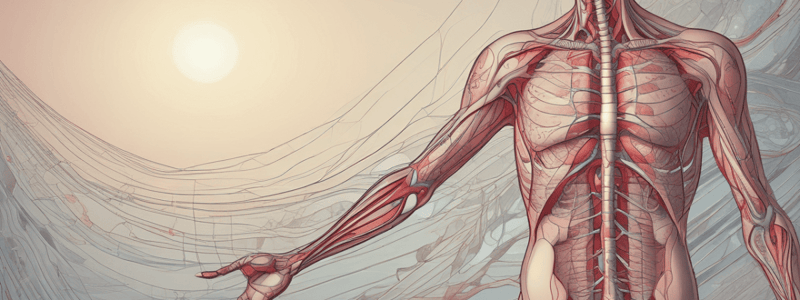Podcast
Questions and Answers
What determines the type of blood an individual has?
What determines the type of blood an individual has?
- The presence or absence of antigens and antibodies on the surface of red blood cells (correct)
- The type of blood vessels present
- The rate of blood flow in the body
- The presence of certain hormones in the blood
What is the primary function of the clotting process?
What is the primary function of the clotting process?
- To regulate blood flow
- To produce blood cells
- To stop bleeding when a blood vessel is damaged (correct)
- To form new blood vessels
What system is responsible for regulating blood flow?
What system is responsible for regulating blood flow?
- The immune system
- The autonomic nervous system (correct)
- The circulatory system
- The musculoskeletal system
Where does blood cell formation primarily occur?
Where does blood cell formation primarily occur?
What type of blood vessel is responsible for facilitating the exchange of nutrients, oxygen, and waste products between blood and cells?
What type of blood vessel is responsible for facilitating the exchange of nutrients, oxygen, and waste products between blood and cells?
What carries oxygenated blood away from the heart?
What carries oxygenated blood away from the heart?
Flashcards are hidden until you start studying
Study Notes
The circulatory system plays a crucial role in delivering oxygen, nutrients, and hormones to cells while removing waste products like carbon dioxide. It consists of the heart, blood, and blood vessels, which work together to maintain the body's internal environment.
Blood Types
There are four main blood types: A, B, AB, and O. These types are determined by the presence or absence of antigens and antibodies on the surface of red blood cells.
Clotting Process
The clotting process, also known as coagulation, is a series of steps that help stop bleeding when a blood vessel is damaged. It involves various clotting factors and platelets, which work together to form a blood clot.
Blood Flow Regulation
Blood flow regulation is maintained by the autonomic nervous system, which controls the rate of blood flow through blood vessels. This regulation helps maintain consistent blood pressure and oxygen delivery to cells.
Blood Cell Formation
Blood cell formation, or hematopoiesis, occurs primarily in the bone marrow. It involves the production of red blood cells, white blood cells, and platelets.
Blood Vessel Types
There are three main types of blood vessels: arteries, veins, and capillaries. Arteries carry oxygenated blood away from the heart, veins carry deoxygenated blood back to the heart, and capillaries facilitate the exchange of nutrients, oxygen, and waste products between blood and cells.
Blood Vessel Layers
Blood vessels have three layers: an inner endothelial layer, a middle smooth muscle layer, and an outer fibrous layer (adventitia). These layers help maintain the integrity and function of the blood vessels.
Blood Components
Blood is composed of plasma, red blood cells (erythrocytes), white blood cells (leukocytes), platelets (thrombocytes), and various proteins. These components work together to maintain the body's internal balance and support various physiological processes.
Studying That Suits You
Use AI to generate personalized quizzes and flashcards to suit your learning preferences.



